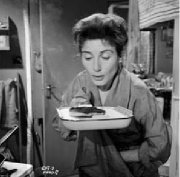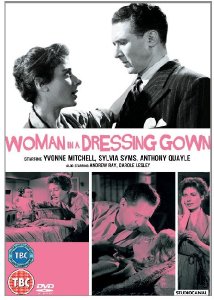1957 drama Woman in a Dressing Gown comes to cinemas and DVD this July and August
We always love a distributor that aims to bring the best of classic cinema to the home, much of which is lovingly restored. For this reason, we naturally love StudioCanal who yet again are bringing something we would otherwise probably never get to see.
Re-mastered and getting a limited cinema release from 27th July, and then DVD release from 13th August, Woman in a Dressing Gown has apparently not been seen in any significant form since its original 1957 airing.
Directed by J. Lee Thompson, and based by Ted Willis his own TV drama of the same name, this stars Yvonne Mitchell, Anthony Quayle and Sylvia Syms. It follows the turmoil caused when a husband of 20 years tells his wife he is leaving her for a younger woman.
Synopsis follows...
Amy is a hopeless housewife. She burns meals, doesn't finish the housework, listens to the radio too loud, and some days doesn't event get around to getting dressed. By contrast her husband Jim is far more together, and still attractive. Jim has fallen in love with his young, beautiful secretary Georgie, and when he tells Amy he is leaving her, her already fragile world threatens to fall apart.
A heart-wrenching and accomplished drama, the power of the work is in its refusal to demonize any of its principal characters - not Amy for her failure to maintain the family home, Jim for his infidelity, or Georgie for her role as the other woman.
Released in 1957, the film anticipated not only the British New Wave of Social Realism, but also Betty Friedan's ground-breaking book The Feminine Mystique. It shows us that Amy's hopelessness in the home is born out of loneliness, boredom and depression, dissatisfaction with her "confinement" to the home that Freidan later labeled "the problem with no name".
As such the film can be heralded as more progressive, at least in terms of gender politics, than its better known successors - Saturday Night and Sunday Morning, Look Back in Anger etc - because it has as its heart a middle-aged housewife, rather than an angry young man.
Re-mastered and getting a limited cinema release from 27th July, and then DVD release from 13th August, Woman in a Dressing Gown has apparently not been seen in any significant form since its original 1957 airing.
Directed by J. Lee Thompson, and based by Ted Willis his own TV drama of the same name, this stars Yvonne Mitchell, Anthony Quayle and Sylvia Syms. It follows the turmoil caused when a husband of 20 years tells his wife he is leaving her for a younger woman.
Synopsis follows...
Amy is a hopeless housewife. She burns meals, doesn't finish the housework, listens to the radio too loud, and some days doesn't event get around to getting dressed. By contrast her husband Jim is far more together, and still attractive. Jim has fallen in love with his young, beautiful secretary Georgie, and when he tells Amy he is leaving her, her already fragile world threatens to fall apart.
A heart-wrenching and accomplished drama, the power of the work is in its refusal to demonize any of its principal characters - not Amy for her failure to maintain the family home, Jim for his infidelity, or Georgie for her role as the other woman.
Released in 1957, the film anticipated not only the British New Wave of Social Realism, but also Betty Friedan's ground-breaking book The Feminine Mystique. It shows us that Amy's hopelessness in the home is born out of loneliness, boredom and depression, dissatisfaction with her "confinement" to the home that Freidan later labeled "the problem with no name".
As such the film can be heralded as more progressive, at least in terms of gender politics, than its better known successors - Saturday Night and Sunday Morning, Look Back in Anger etc - because it has as its heart a middle-aged housewife, rather than an angry young man.


































Your Opinions and Comments
Be the first to post a comment!